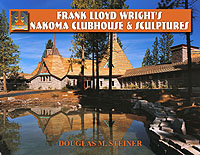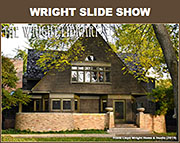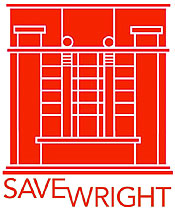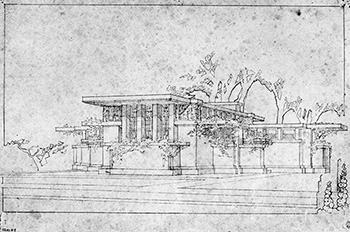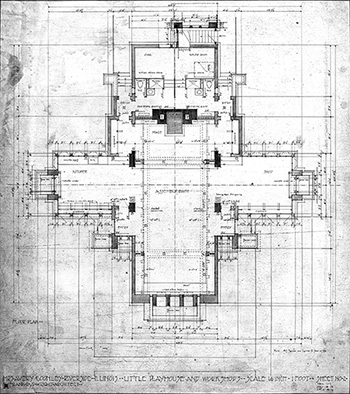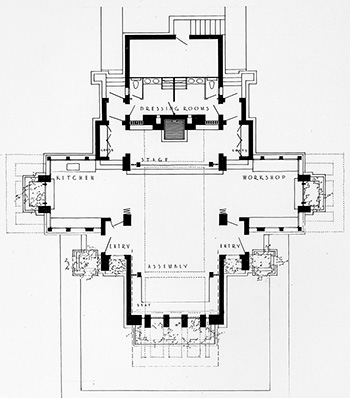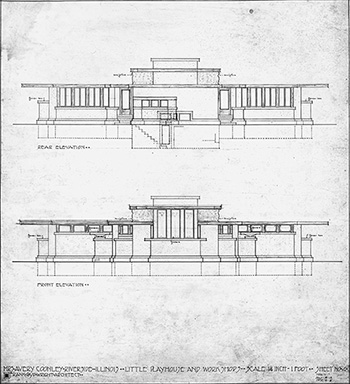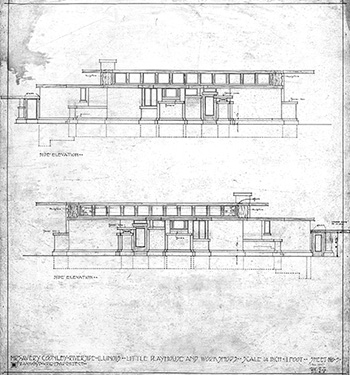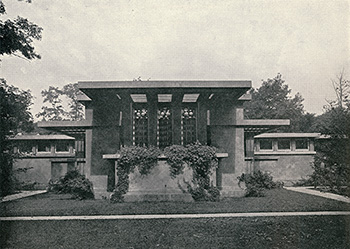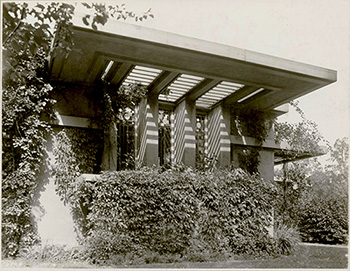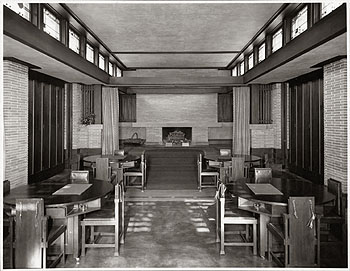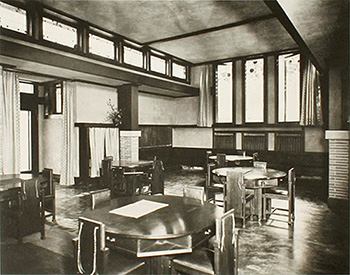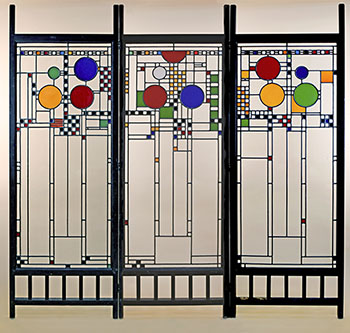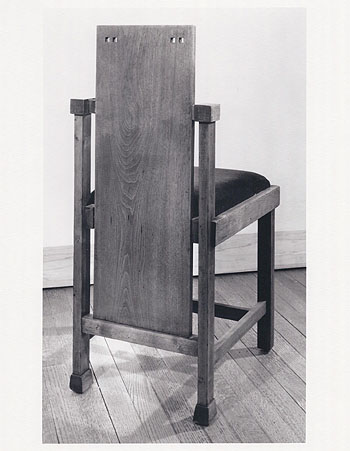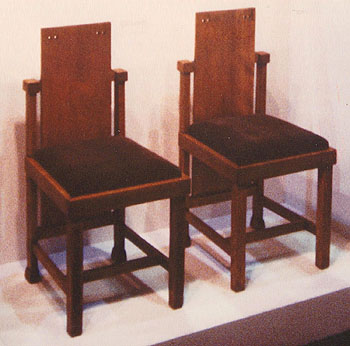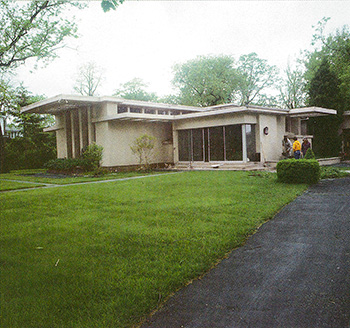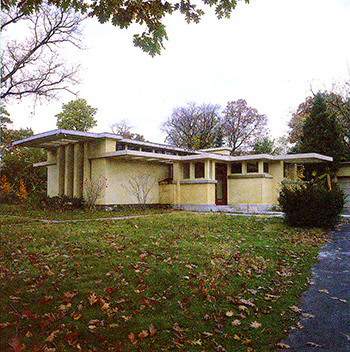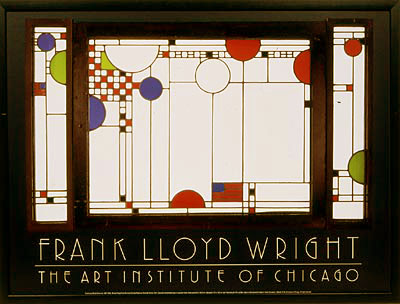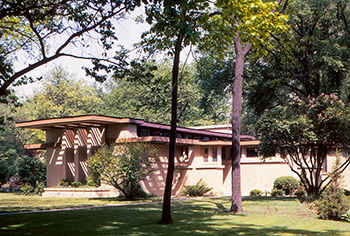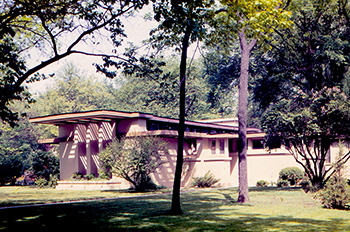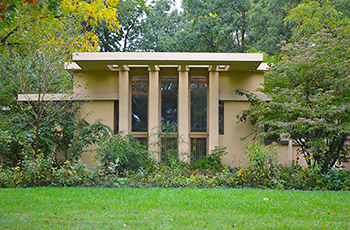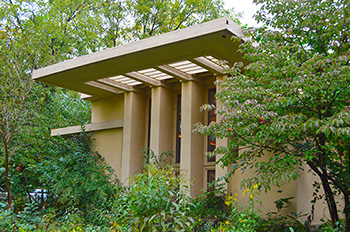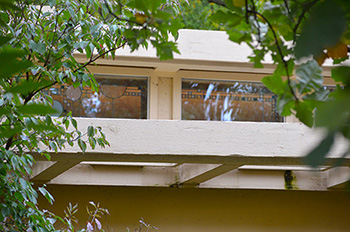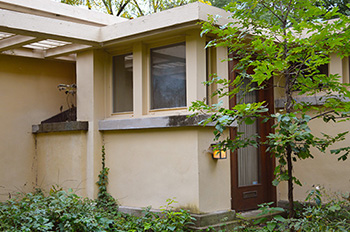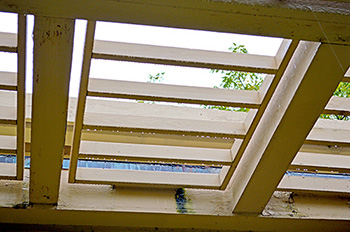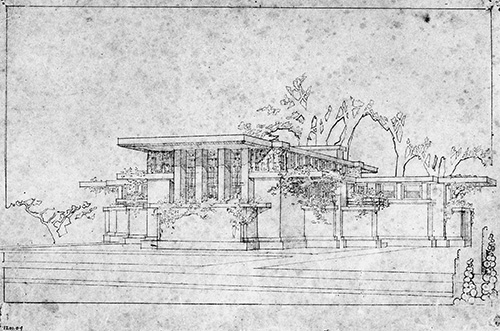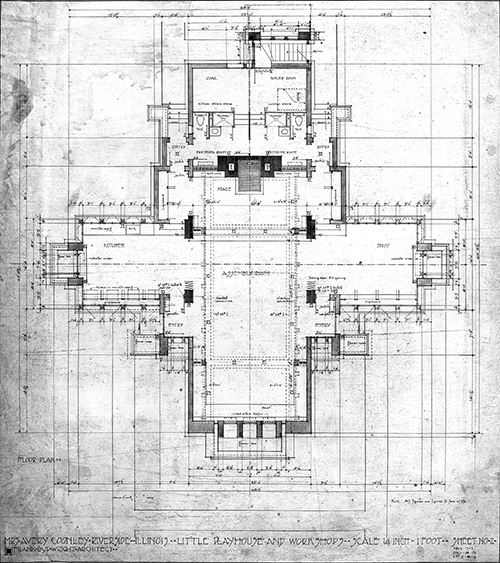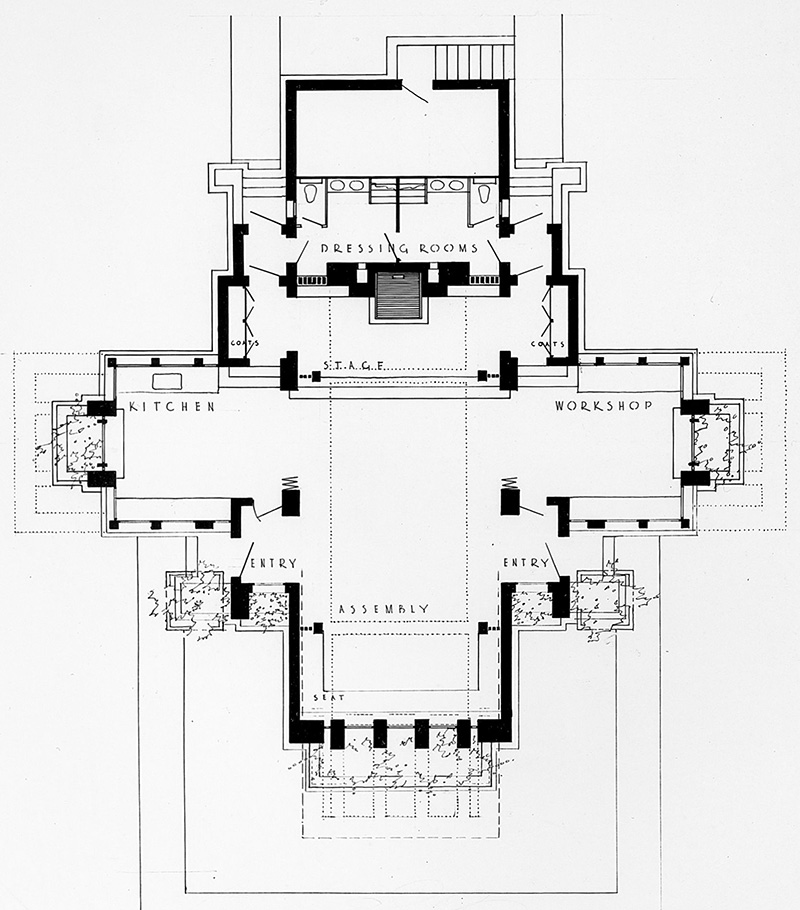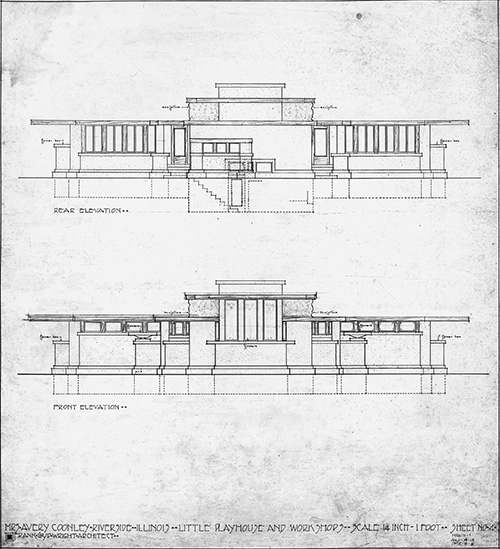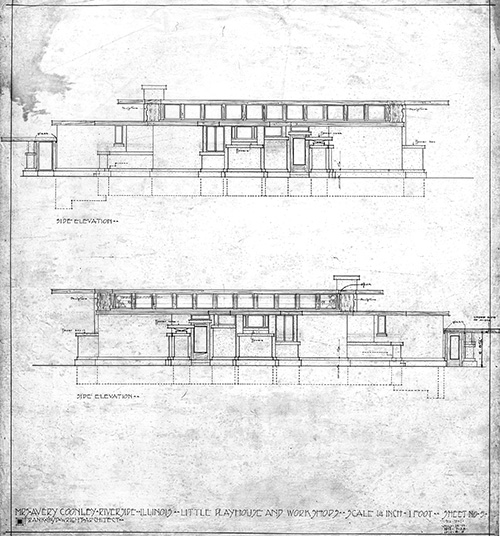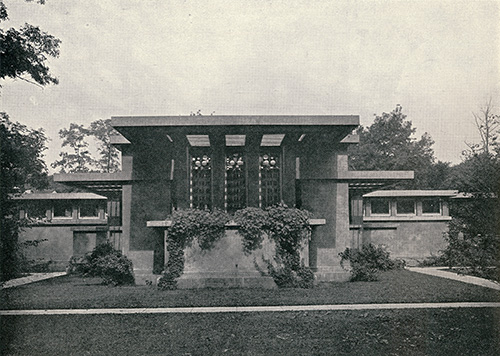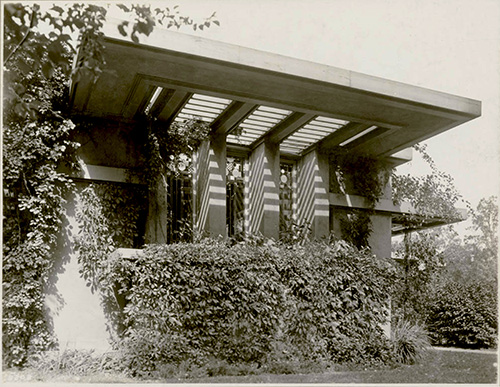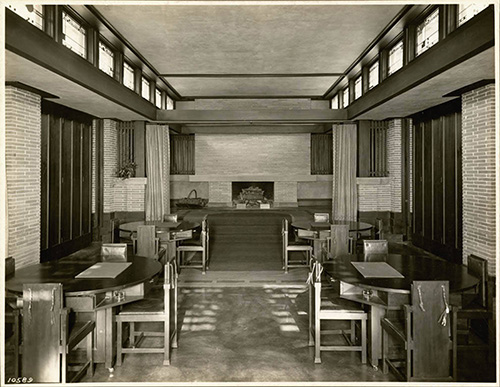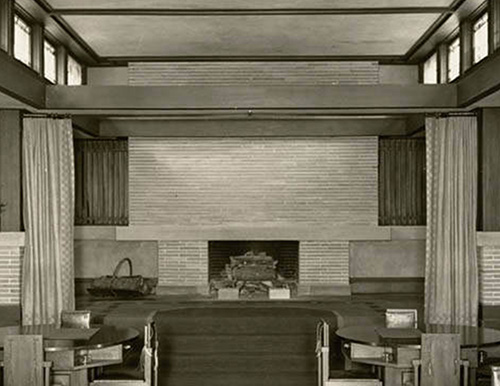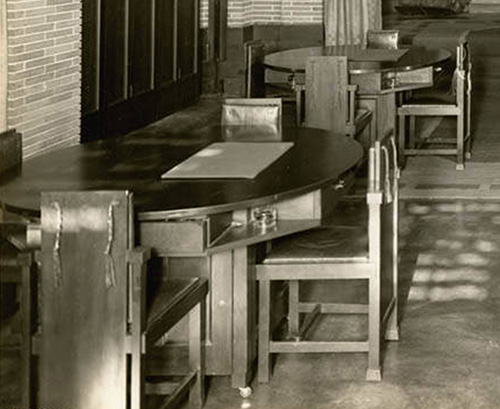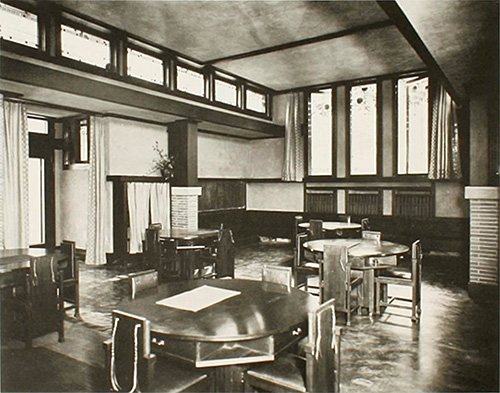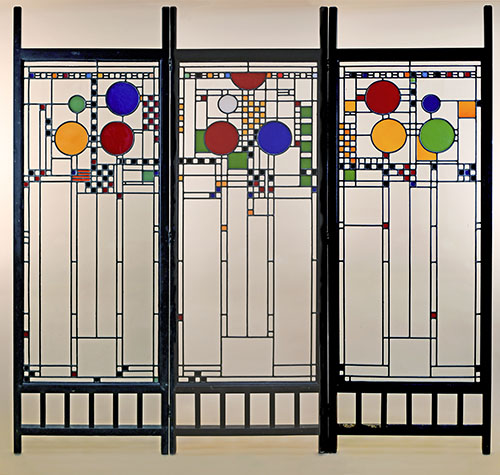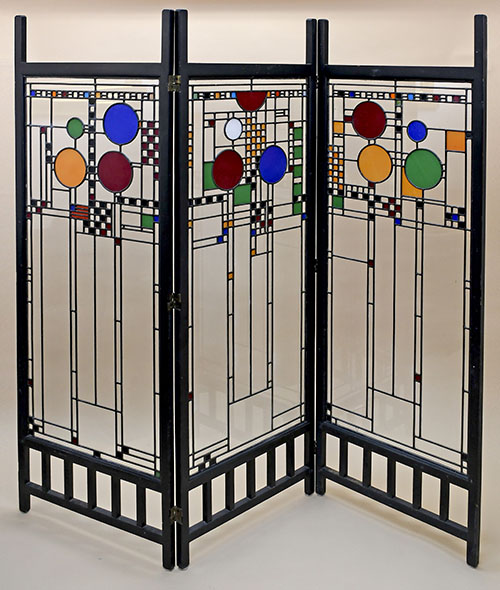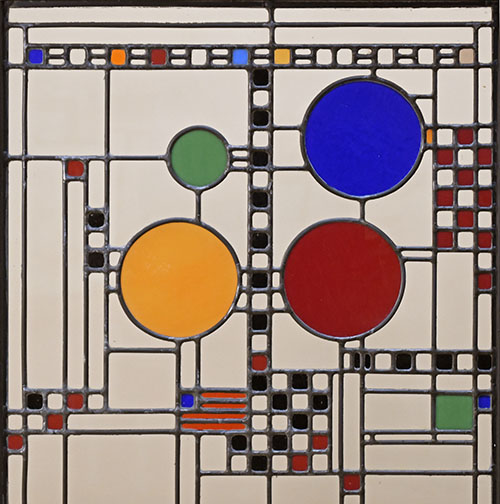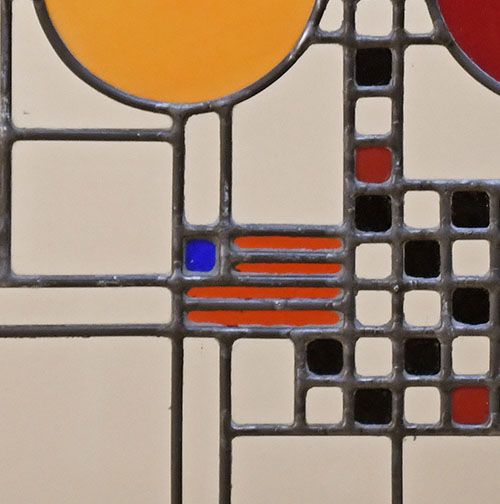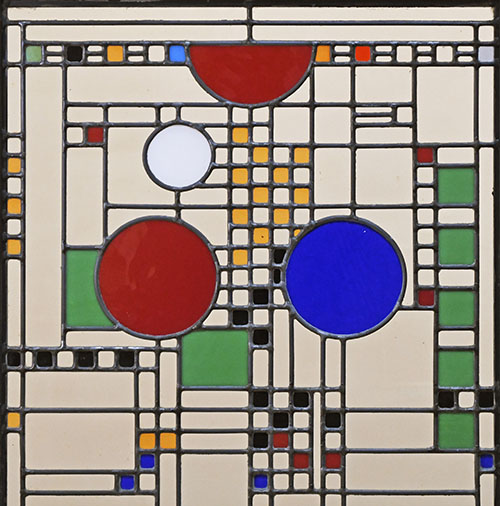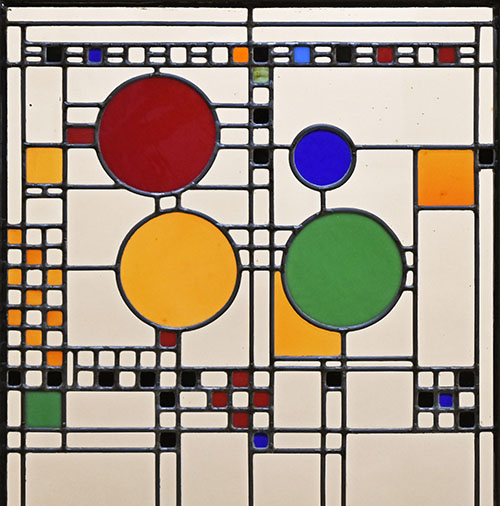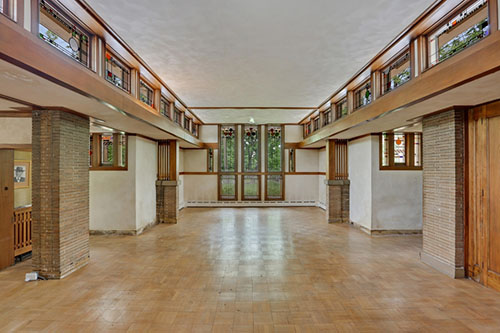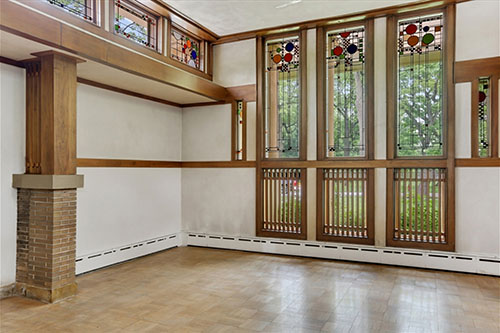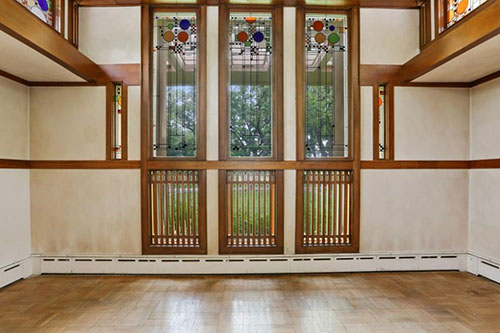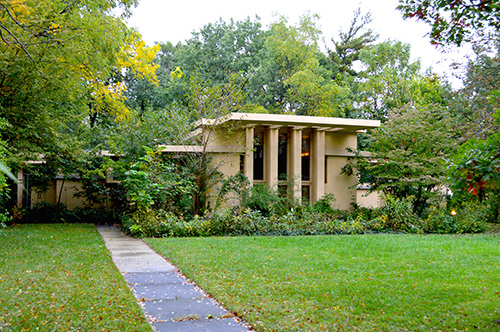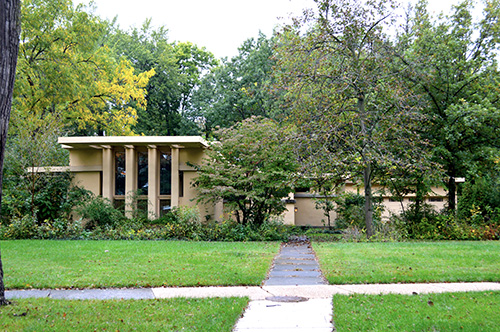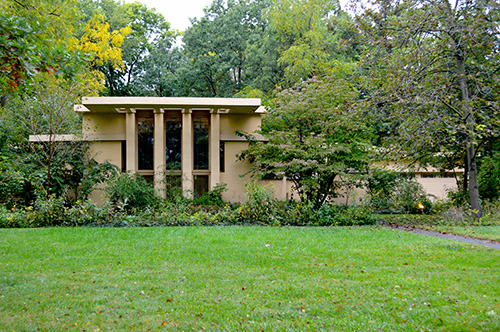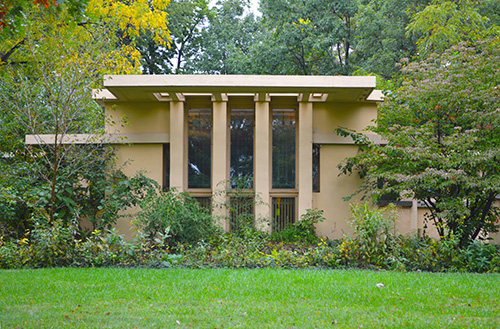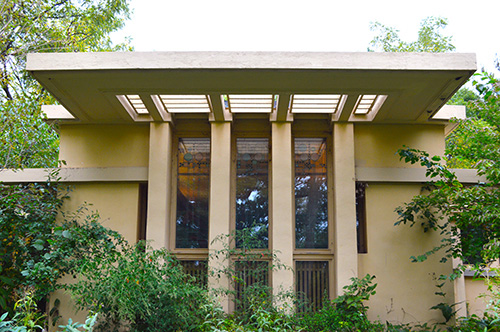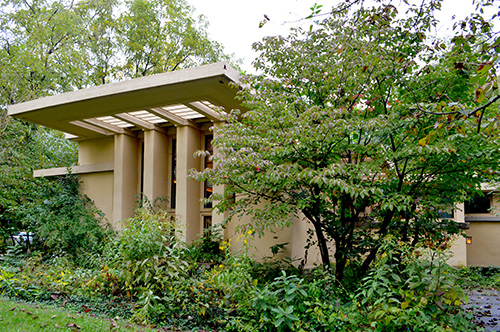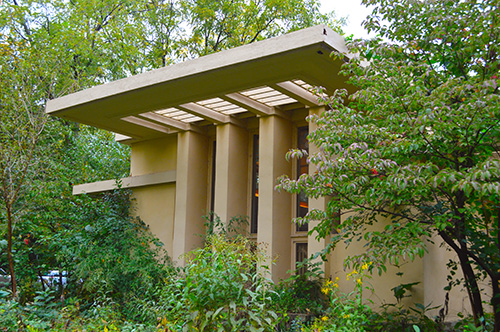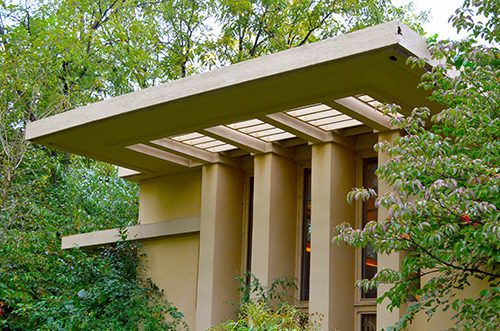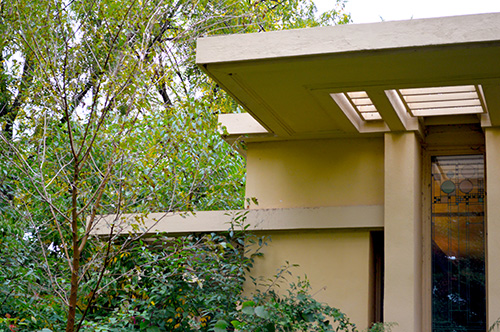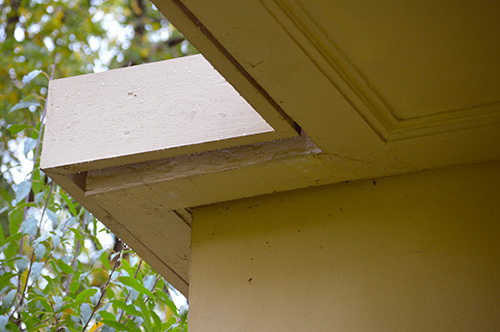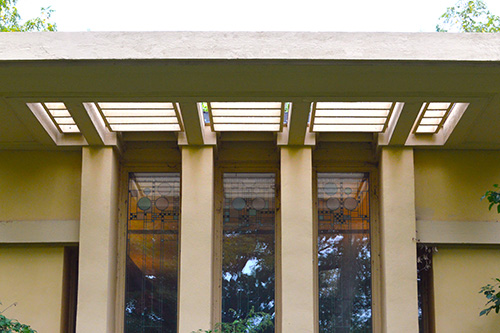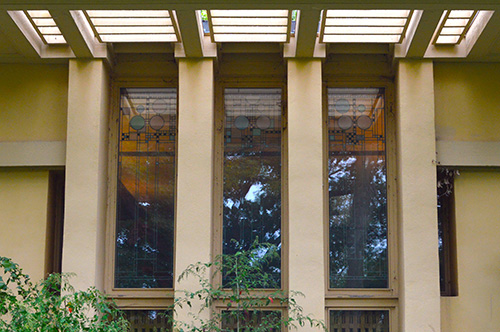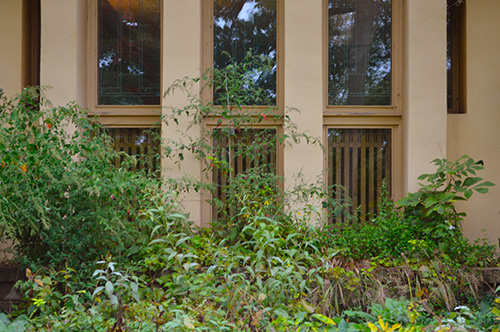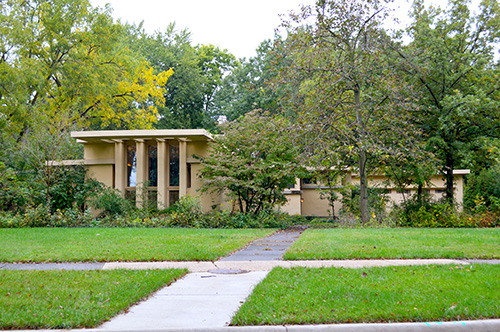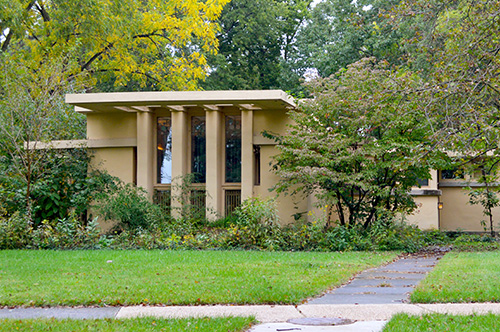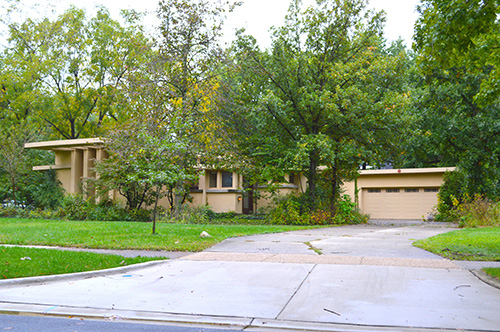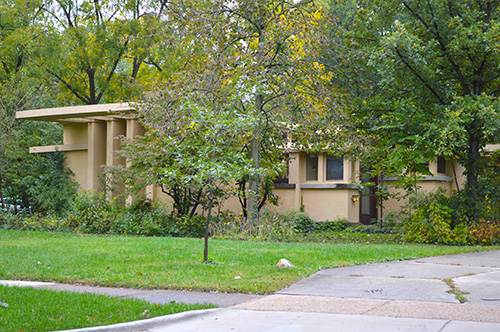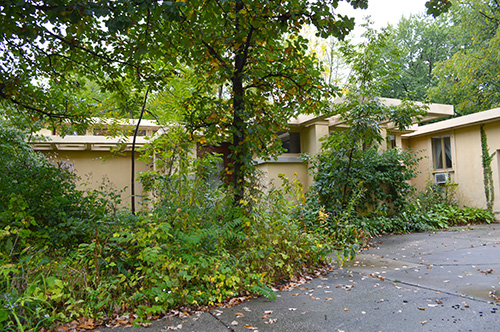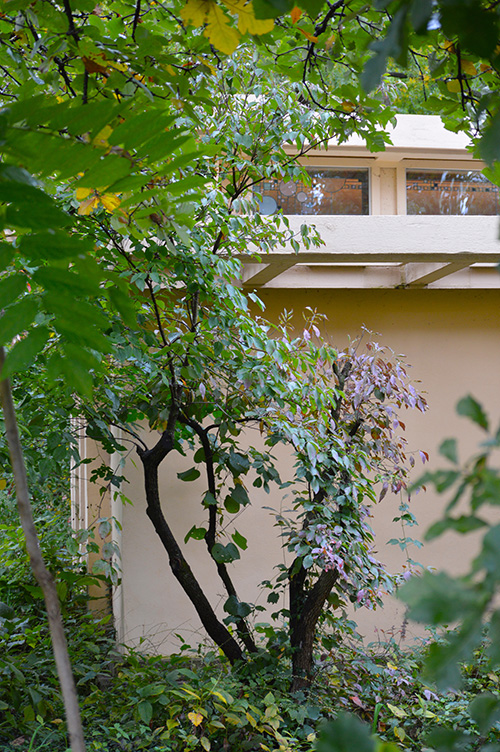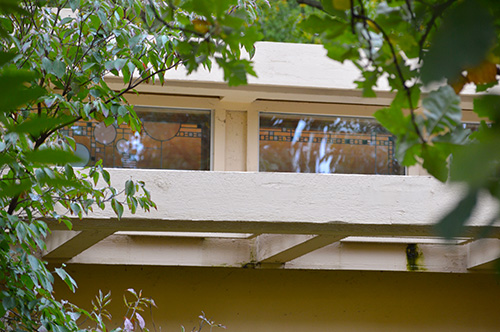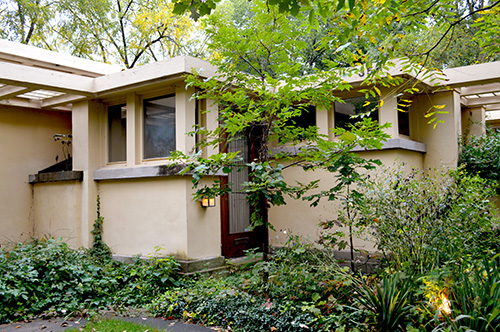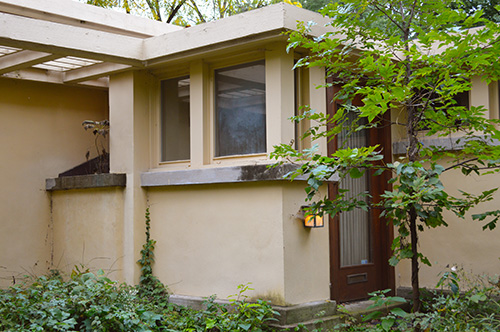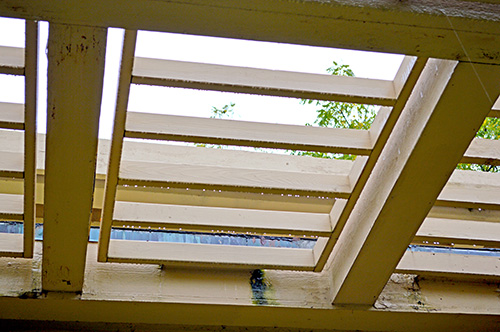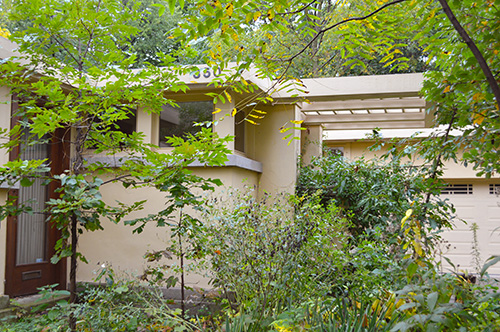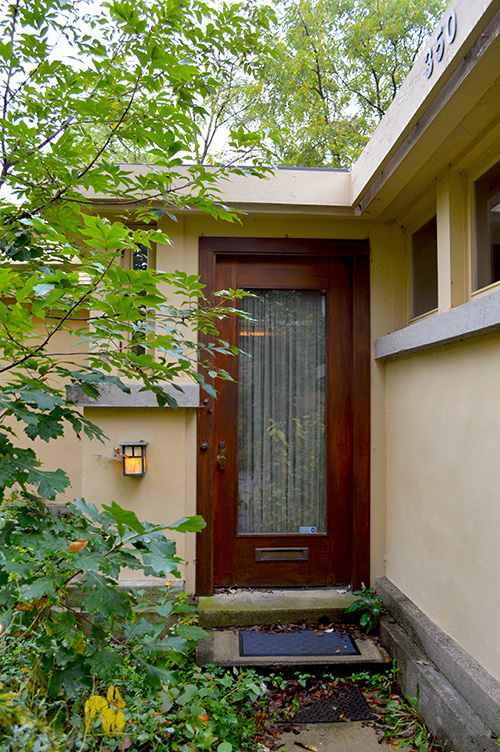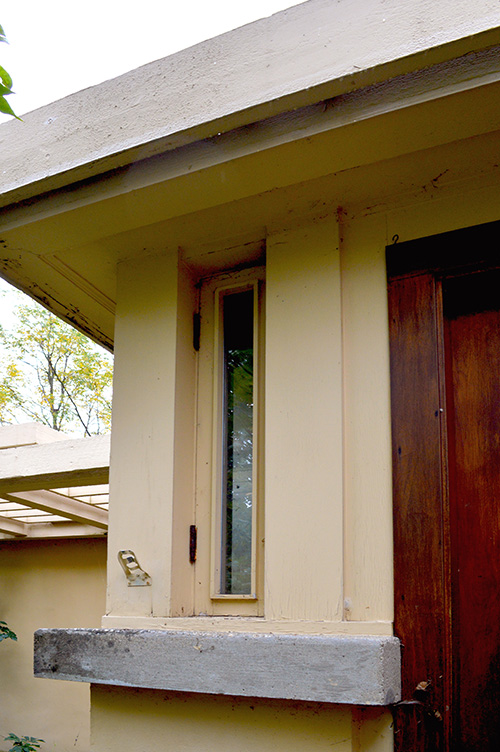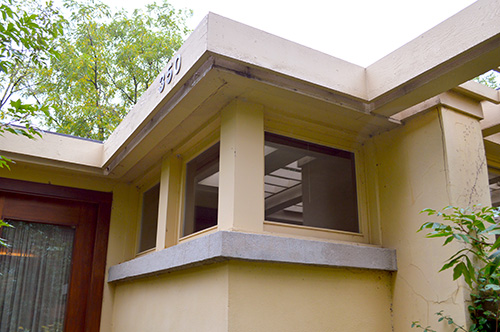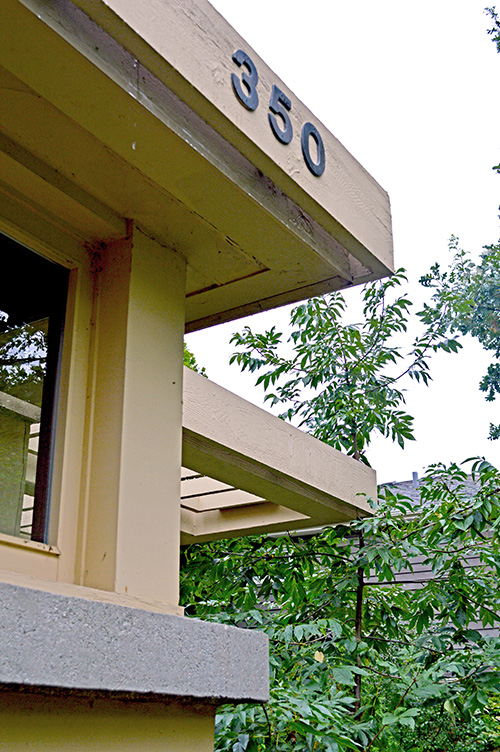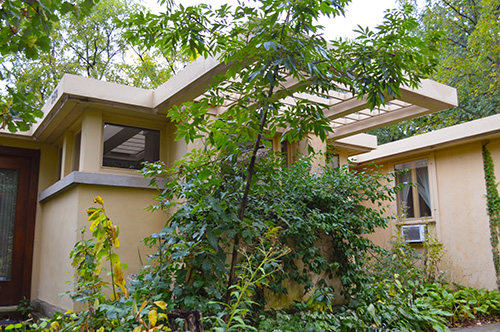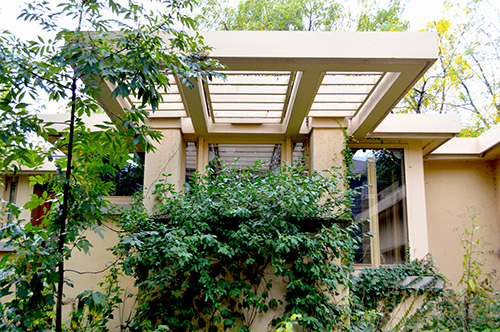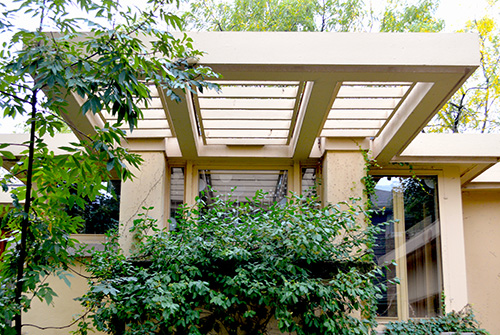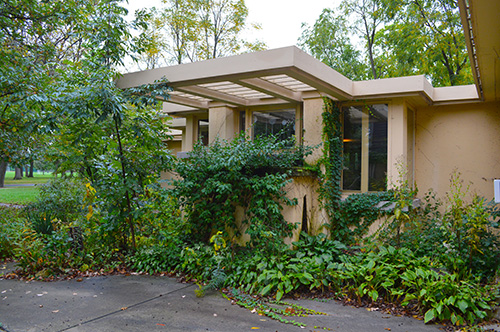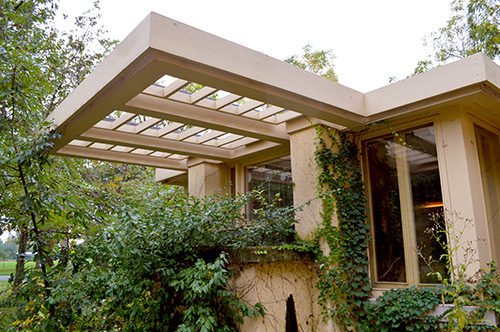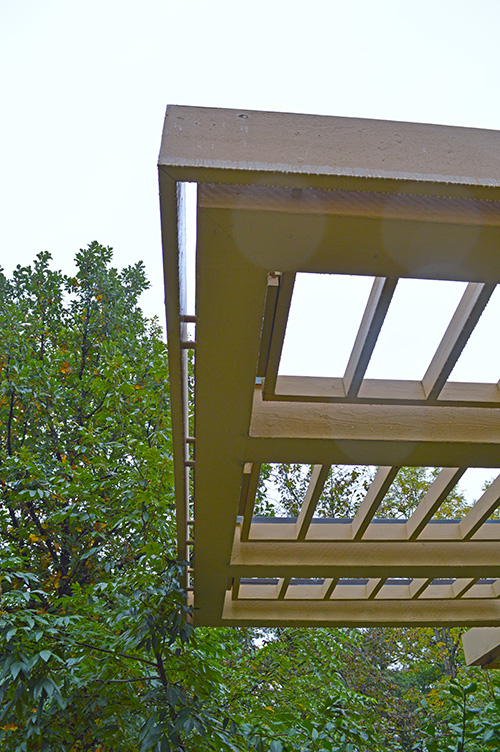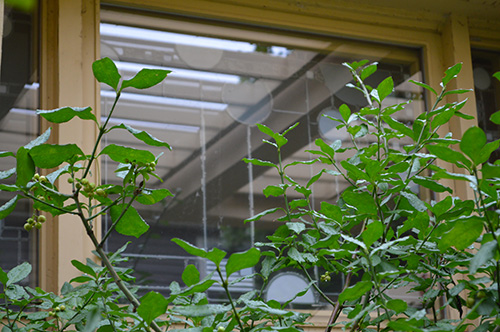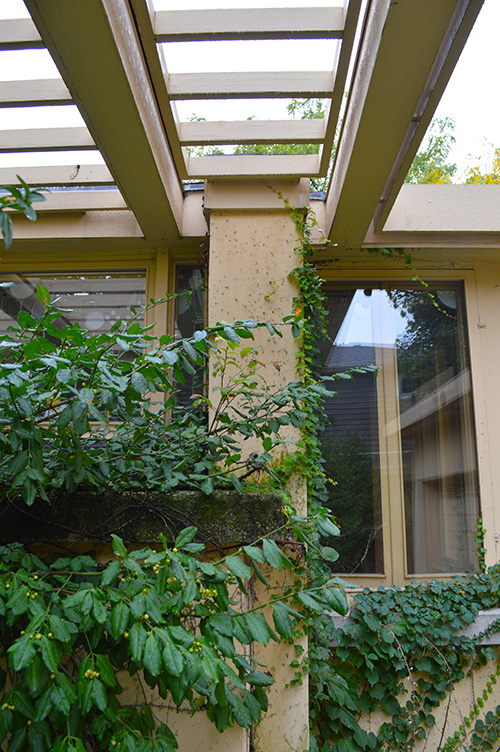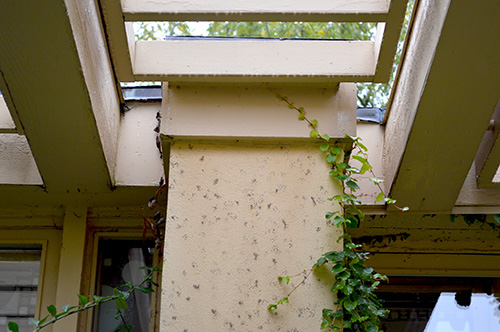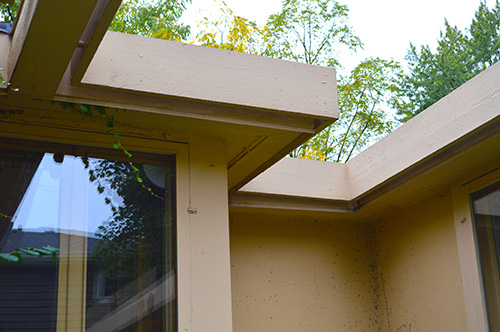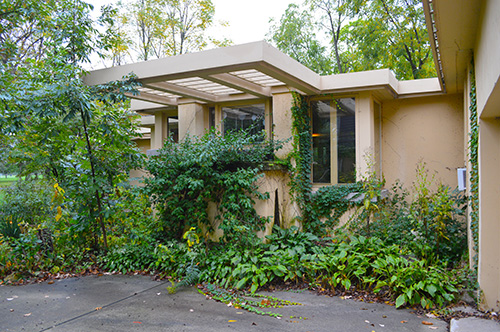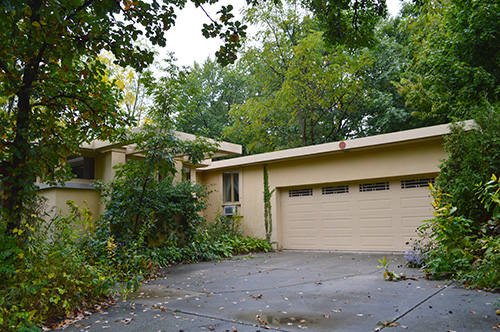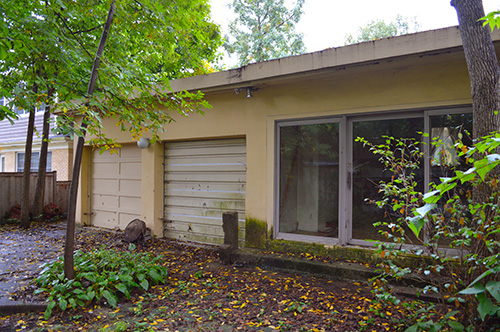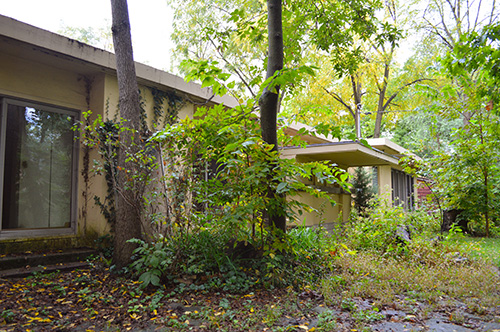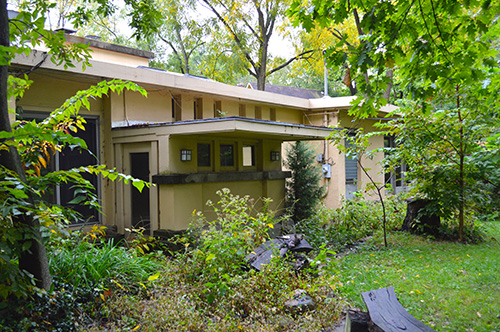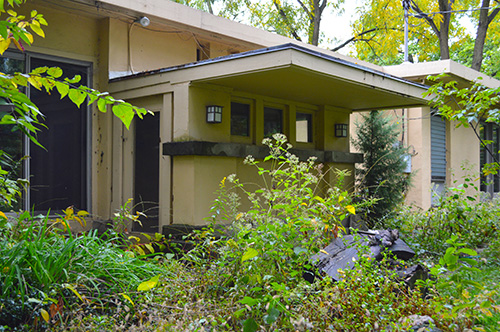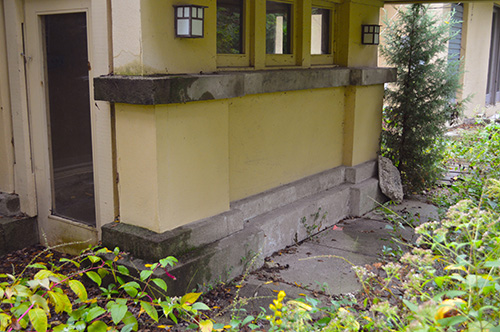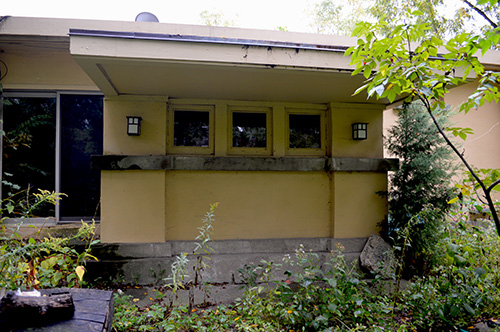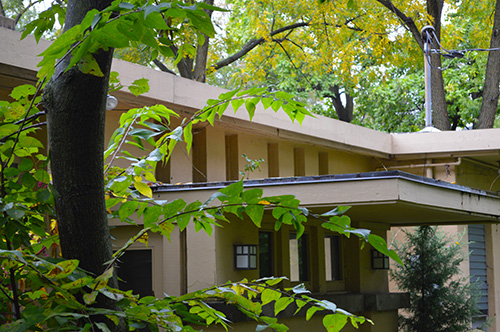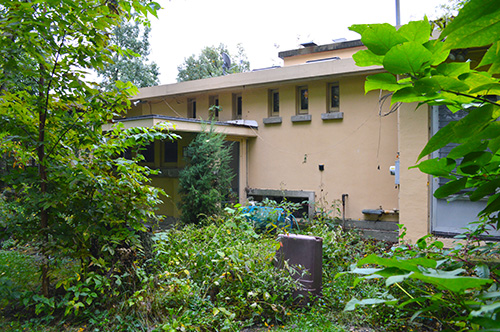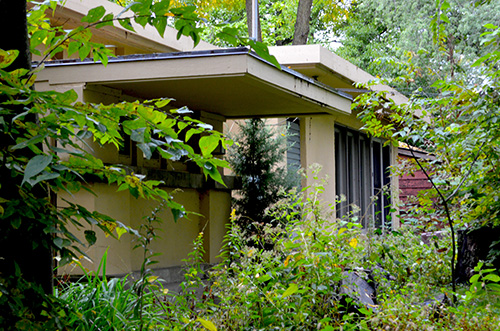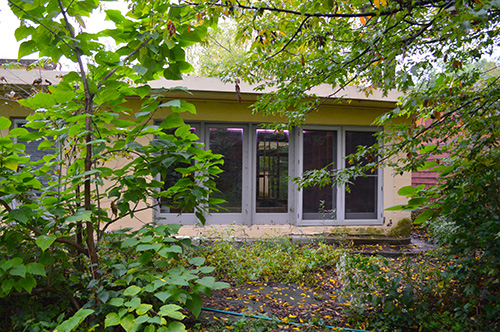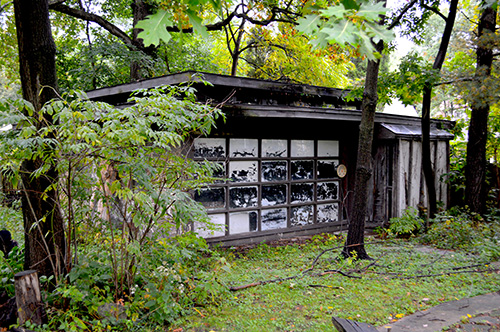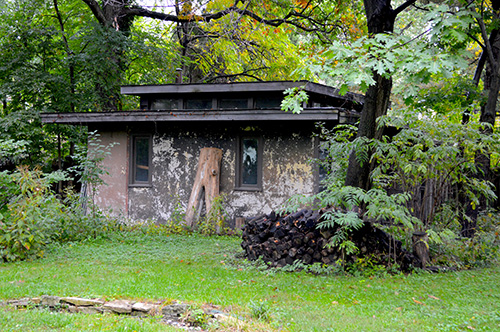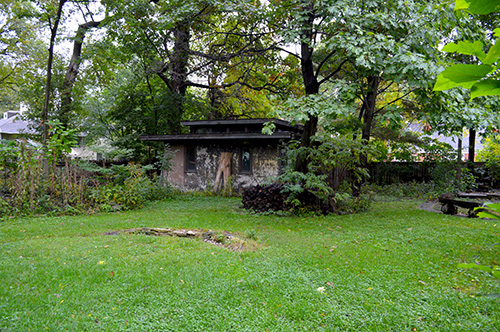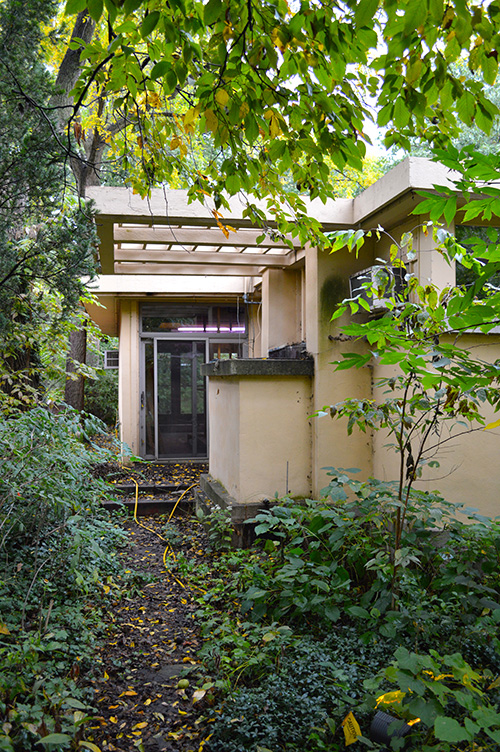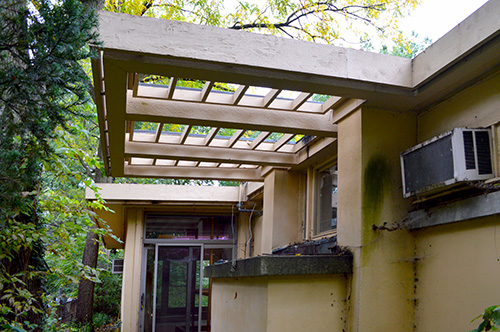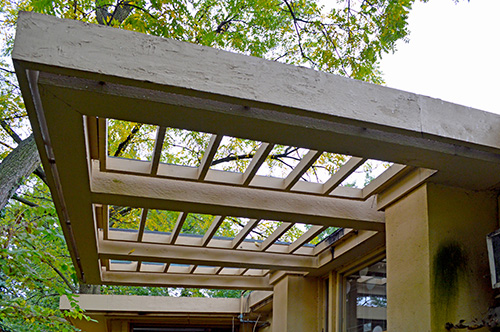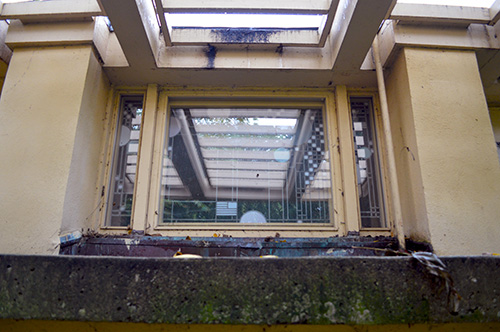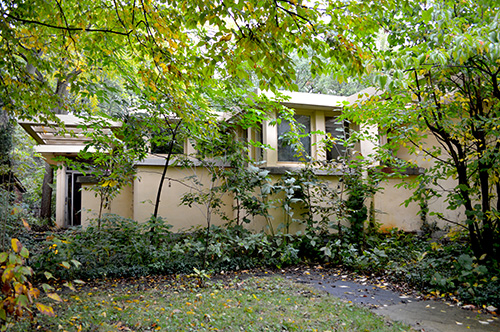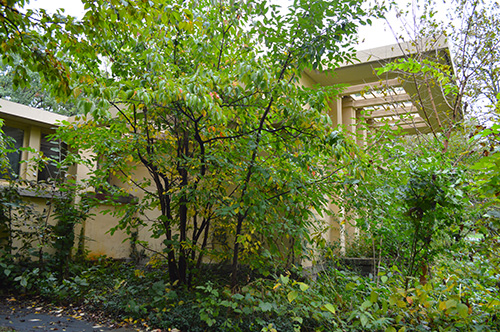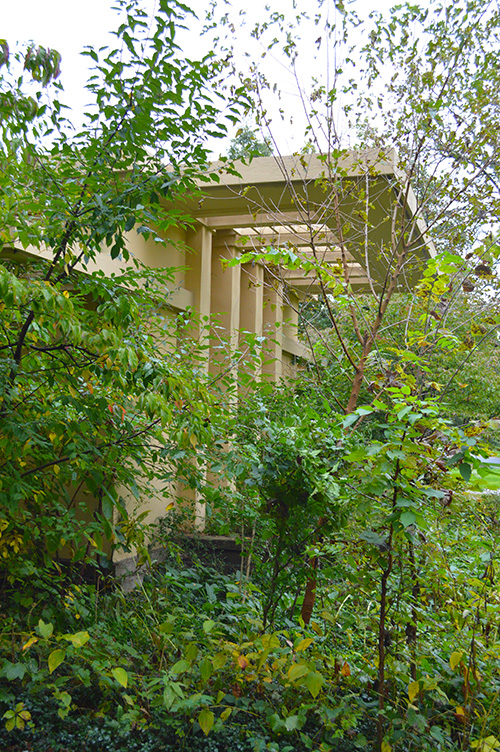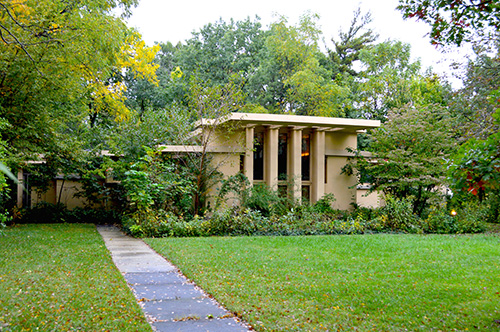
SUPPORT THE
WRIGHT LIBRARY
PROCEEDS FROM EVERY SALE GOES TO SUPPORT THE WRIGHT LIBRARY.
CLICK TO ORDER.
WE PROUDLY SUPPORT THE FRANK LLOYD WRIGHT FOUNDATION
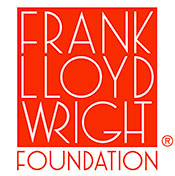
WE PROUDLY SUPPORT THE FRANK LLOYD WRIGHT BUILDING CONSERVANCY
WE PROUDLY SUPPORT FALLINGWATER
AND THE WESTERN PENNSYLVANIA CONSERVANCY

AVERY COONLEY PLAYHOUSE, RIVERSIDE, ILLINOIS (1912 - S.174) AVERY COONLEY RESIDENCE COONLEY COACH HOUSE GARDENER'S COTTAGE
COONLEY PLAYOUSE PLANS (1912) FLOOR PLAN (1912) PLAYHOUSE (1913) PLAYHOUSE (1915)
COONLEY PLAYHOUSE TRIPTYCH (1980) AVERY COONLEY PLAYHOUSE (2018) ADDITIONAL WRIGHT STUDIESDate: 1912
Title: Avery Coonley Playhouse, Riverside, Illinois, Perspective 1912 (FLLW #1201.04) (1912 - S.174) .
Description: Perspective illustration of the Avery Coonley Playhouse. Designed by Frank Lloyd Wright in 1912. Possibly Frank Lloyd Wright’s most famous triptych dominates the front elevation of the playhouse. Hand written text lower left: “1201.04.”
When Frank Lloyd Wright was published in seven issues of Wendingen Volume II No. 3-9, October 1925 - April 1926, he felt the Playhouse important enough to include two plans, a perspective illustration, and four photographs, p.28-33. Courtesy of the Frank Lloyd Wright Archives, Avery Library, Columbia University. (FLLW #1201.04). See Additional Details...
Size: 10 x 7 B&W photograph.
S#: 0114.54.0625Date: 1912
Title: Avery Coonley Playhouse, Riverside, Illinois, Floor Plan 1912 (FLLW #1201.14) (1912 - S.174) .
Description: Floor plan for the Avery Coonley Playhouse. Designed by Frank Lloyd Wright in 1912. The plan included the main assembly area, a stage with a fireplace and a dressing room behind it, a kitchen and workshop. Lower text: “Mrs. Avery Coonley, Riverside, Illinois. Little Playhouse and Workshops. Sheet No. 2. Frank Lloyd Wright, Architect.”
When Frank Lloyd Wright was published in seven issues of Wendingen Volume II No. 3-9, October 1925 - April 1926, he felt the Playhouse important enough to include two plans, a perspective illustration, and four photographs, p.28-33. Courtesy of the Frank Lloyd Wright Archives, Avery Library, Columbia University. (FLLW #1201.14). See Additional Details...
Size: 8 x 10 B&W photograph.
S#: 0114.50.0625Date: 1912
Title: Avery Coonley Playhouse, Riverside, Illinois, Floor Plan 1912 (FLLW #1201.23) (1912 - S.174) .
Description: Floor plan for the Avery Coonley Playhouse. Designed by Frank Lloyd Wright in 1912. The plan included the main assembly area, a stage with a fireplace and a dressing room behind it, a kitchen and workshop. When Frank Lloyd Wright was published in seven issues of Wendingen Volume II No. 3-9, October 1925 - April 1926, he felt the Playhouse important enough to include two plans, a perspective illustration, and four photographs, p.28-33. Courtesy of the Frank Lloyd Wright Archives, Avery Library, Columbia University. (FLLW #1201.23). See Additional Details...
Size: 8 x 10 B&W photograph.
S#: 0114.51.0625Date: 1912
Title: Avery Coonley Playhouse, Riverside, Illinois, Elevations 1912 (FLLW #1201.16) (1912 - S.174) .
Description: Front and rear elevations for the Avery Coonley Playhouse. Designed by Frank Lloyd Wright in 1912. A row of windows on either side dominates the rear elevation. Possibly Frank Lloyd Wright’s most famous triptych dominates the front elevation of the playhouse. Lower text: “Mrs. Avery Coonley, Riverside, Illinois. Little Playhouse and Workshops. Sheet No. 4. Frank Lloyd Wright, Architect.”
When Frank Lloyd Wright was published in seven issues of Wendingen Volume II No. 3-9, October 1925 - April 1926, he felt the Playhouse important enough to include two plans, a perspective illustration, and four photographs, p.28-33. Courtesy of the Frank Lloyd Wright Archives, Avery Library, Columbia University. (FLLW #1201.16) See Additional Details...
Size: 8 x 10 B&W photograph.
S#: 0114.53.0623Date: 1912
Title: Avery Coonley Playhouse, Riverside, Illinois, Elevations 1912 (FLLW #1201.17) (1912 - S.174) .
Description: Two side elevations for the Avery Coonley Playhouse. Designed by Frank Lloyd Wright in 1912. A row of clerestory windows dominate both sides of the elevations. Lower text: “Mrs. Avery Coonley, Riverside, Illinois. Little Playhouse and Workshops. Sheet No. 5. Frank Lloyd Wright, Architect.”
When Frank Lloyd Wright was published in seven issues of Wendingen Volume II No. 3-9, October 1925 - April 1926, he felt the Playhouse important enough to include two plans, a perspective illustration, and four photographs, p.28-33. Courtesy of the Frank Lloyd Wright Archives, Avery Library, Columbia University. (FLLW #1201.17) See Additional Details...
Size: 8 x 10 B&W photograph.
S#: 0114.52.0625Date: 1913
Title: Avery Coonley Playhouse, Riverside, Illinois, Exterior Circa 1913 (1912 - S.174).
Description: Perspective view of the front elevation of the Avery Coonley Playhouse from the South. Mrs. Avery (Queene Ferry) Coonley, a believer in early childhood education, attempted to enroll her daughter in Kindergarten. She was denied entrance because her daughter was not yet five. In 1906, Mrs. Coonley formed the Cottage School in Riverside, Illinois, a private independent school. Designed by Frank Lloyd Wright in 1912 to accommodate the growth of the Cottage School. Possibly Frank Lloyd Wright’s most famous triptych dominates the front elevation of the playhouse.
Copy photograph of the Coonley Playhouse published in Wendingen Volume II No. 4, November, 1925, p.31. Also published in In The Nature of Material, Hitchcock, 1942, Plate 185. Photographed by Henry Feurmann. See Additional Details...
Size: 10 x 8 B&W photograph.
S#: 0120.34.0625Date: 1915
Title: Avery Coonley Playhouse, Riverside, Illinois, Exterior Circa 1915 (1912 - S.174).
Description: Perspective view of the front elevation of the Avery Coonley Playhouse from the South. Mrs. Avery (Queene Ferry) Coonley, a believer in early childhood education, attempted to enroll her daughter in Kindergarten. She was denied entrance because her daughter was not yet five. In 1906, Mrs. Coonley formed the Cottage School in Riverside, Illinois, a private independent school. Designed by Frank Lloyd Wright in 1912 to accommodate the growth of the Cottage School. Possibly Frank Lloyd Wright’s most famous triptych dominates the front elevation of the playhouse. Photographed by Henry Feurmann. See Additional Details...
Size: 10 x 8 B&W photograph.
S#: 0128.88.0625Date: Circa 1915 Title: Avery Coonley Playhouse (1912 - S.174) interior, circa 1915.
Description: View of the interior from the South end toward the Fireplace. In 1906, Mrs. Coonley formed the Cottage School in Riverside, Illinois, a private independent school. In 1912, Wright designed the Coonley Playhouse to accommodate the growth of the Cottage School. The Fireplace and Stage are in the background. The Kitchen is through the folding doors on the left. The Workshop is through the folding doors on the right. Wright designed art glass decorate the clerestory windows. Wright designed tables and chairs fill the Assembly area. Photographed by Henry Feurmann. Original 10 x 7.75 B&W photograph. See Additional Details...
Size: 10 x 7.75 B&W photograph.
S#: 0128.13.0613
Date: 1915
Title: Avery Coonley Playhouse, Riverside, Illinois, interior, circa 1915 (1912 - S.174).
Description: Interior view from the North end toward the triptych. In 1906, Mrs. Coonley formed the Cottage School in Riverside, Illinois, a private independent school. In 1912, Wright designed the Coonley Playhouse to accommodate the growth of the Cottage School. The Workshop is to the left. Wright designed art glass that decorate the clerestory windows. Wright also designed the tables and chairs that fill the Assembly area. Photographed by Henry Feurmann. Published in Wendingen Volume II No. 4, November, 1925, p.33.
Size: Original 10 x 8 B&W photograph.
S#: 0128.89.0625Date: Circa 1980
Title: Avery Coonley Playhouse, Riverside, Illinois, Leaded Art Glass Triptych Windows, Circa 1980 (Not Dated.) (1912 - S.174).
Description: Reproduction of the Avery Coonley Playhouse Triptych Leaded Art Glass windows. After Frank Lloyd Wright. This is a very close representation, but not exact. The upper third of each panel is very close to the original with minor variations. The lower two-thirds has been condensed in height. No manufacturer's marks on the frame or glass could be found. We searched the Frank Lloyd Wright Foundation catalogs going back to the mid-1980s, but found no examples. We finally contacted the Frank Lloyd Wright Foundation and they did not recognize it as one of their licenced products. Oakbrook Esser Studio, does have a licence to produce Wright art glass, but this was not manufactured by them. We can only surmise that this may have been manufactured prior to the Foundation licencing products. Both the art glass and frame are well constructed.
Designed by Frank Lloyd Wright in 1912. Mrs. Queene Ferry Coonley graduated from Vassar College in 1896 and married Avery Coonley in 1901... See additional photographs...
Size: Glass: 19.25" x 45." Frame: 22" x 62.75." Three panels: 66" x 62.75."
ST#: 1996.65.0123Date: 1981 Title: Avery Coonley Playhouse 1912 Children's Side chair (1912 - S.174) 1981.
Description: Three-quarter view of the back. In 1906, Mrs. Coonley formed the Cottage School in Riverside, Illinois, a private independent school. In 1912, Wright designed the Coonley Playhouse to accommodate the growth of the Cottage School. Frank Lloyd Wright designed child's side chair, 1912. The holes at the top allowed the back padding to be held in place by ropes. Birch, upholstered seat, 32.5 (H) x 15 (W) x 16.5 (D). A variation of the "slant-back" chair Wright designed for his Oak Park home in 1904. Photographed by Thomas Heinz. Acquired from Kelmscott Galleries.
See Additional Wright Designed ChairsSize: Original 8 x 10 B&W photograph.
ST#: 1981.71.0413
Date: 1981 Title: Avery Coonley Playhouse 1912 Children's Side chair (1912 - S.174) 1981.
Description: A pair of chairs, three-quarter view of the front. In 1906, Mrs. Coonley formed the Cottage School in Riverside, Illinois, a private independent school. In 1912, Wright designed the Coonley Playhouse to accommodate the growth of the Cottage School. Frank Lloyd Wright designed child's side chair, 1912. The holes at the top allowed the back padding to be held in place by ropes. Birch, upholstered seat, 32.5 (H) x 15 (W) x 16.5 (D). A variation of the "slant-back" chair Wright designed for his Oak Park home in 1904. Acquired from Kelmscott Galleries.
See Additional Wright Designed Chairs.Size: Original 10 x 8 color photograph.
ST#: 1981.72.0413
Date: Circa 1985
Title: Avery Coonley Playhouse, Riverside, Illinois, Circa 1985 (1912 - S.174).
Description: View of The Coonley Playhouse from the street. Designed by Frank Lloyd Wright in 1912. Copy of a photographs that was published in Progressive Architecture, November, 1987, p.133. Caption: “Coonley Playhouse, Riverside, Illinois, Office of John Vinci. The adaptive use of a Frank Lloyd Wright building presents another set of problems. In the case of the Coonley Playhouse, a small building designed as a kindergarten, its use as a residence necessitated some alterations. Unfortunately, those done in the 1950s were not very sympathetic; the entire interior, including the ceilings and woodwork, were wallpapered, and two wings with sliding glass doors were added to either side of the main block.”
Text on sleeve: “Mod: Arch: Am: Wright, F. L.: Riverside, IL. Res: Coonley, Avery House: Ext: 1912. 039940.” Stamped: “Holy Cross.” Acquired from the archives of the Holy Cross. Photographed by John Vinci.
Size: Original 35mm slide, sandwiched between glass, plastic mount.
ST#: 1985.89.9425Date: 1987
Title: Avery Coonley Playhouse, Riverside, Illinois, 1987 (1912 - S.174).
Description: View of The Coonley Playhouse from the street. Designed by Frank Lloyd Wright in 1912. Copy of a photographs that was published in Progressive Architecture, November, 1987, p.133. Caption: “Coonley Playhouse, Riverside, Illinois, Office of John Vinci. The current owners have removed the wallpaper and largely restored the original interior, and they have removed the two side wings. The dilemma they presented to their architect, John Vinci, was how to preserve the Playhouse and yet still increase the amount of space. What Vinci did was not just to restore the original Wright building, but to reconstruct an addition designed by Prairie School architect William Drummond, the details of which were surmised from old photo-graphs. Vinci then took the more controversial step of building a mirror image of the Drummond addition on the other side of the central block. The result is very much in keeping with the spirit if not the letter of the original.”
Text on sleeve: “Mod: Arch: Am: Wright, F. L.: Riverside, IL. Res: Coonley, Avery House: Ext: (Addition By William Drummond): 1912. Prog. Arch. 11. 87 P.133/88. 039941.” Stamped: “Holy Cross.” Acquired from the archives of the Holy Cross. Photographed by John Vinci.
Size: Original 35mm slide, sandwiched between glass, plastic mount.
ST#: 1987.143.0425Date: 1988 Publication: "Frank Lloyd Wright: The Art Institute of Chicago" (Published by Art
Institute of Chicago)Author: Art Institute of Chicago
Description: "Frank Lloyd Wright (American 1867-1959). Window Triptych from the Avery Coonley Playhouse, Riverside, Illinois 1912. Clear and colored leaded glass in a wooden frame, center pane 89.5 x109.3cm; side panels 91.5x 19.8cm. each. Restricted gilt of Dr. and Mrs. Edwin J. DeCosta and the Walter E. Heller Foundation,1986-88. The art Institute of Chicago." (First Edition)
Size: 35 x 26
ST#: 1988.31.0207
Date: 1995
Title: 1) Avery Coonley Playhouse, Riverside, Illinois, Circa 1995 (Not Dated) (1912 - S.174).
Description: View of the Coonley Playhouse from the street. Designed by Frank Lloyd Wright in 1912. Mrs. Queene Ferry Coonley married Avery Coonley in 1901. They had one child, Elizabeth Ferry Coonley, born in 1902. Mrs. Avery (Queene Ferry) Coonley, a believer in the early childhood education, attempted to enroll her daughter in Kindergarten. She was denied entrance because her daughter was not yet five. In 1906, Mrs. Coonley formed the Cottage School in Riverside, Illinois, a private independent school. In 1912, Wright designed the Coonley Playhouse to accommodate the growth of the Cottage School. Not only did Frank Lloyd Wright designed the school building, he also designed the art glass windows, tables and chairs.
Text on sleeve: “Wright, Frank Lloyd. AC 413. Avery Coonley Playhouse. Ext. 1912. Riverside, IL." Acquired from the archives of Holy Cross.
Size: Original 35mm slide, sandwiched between glass, plastic mount.
ST#: 1995.125.0425-1Date: 1995
Title: 2) Avery Coonley Playhouse, Riverside, Illinois, Circa 1995 (Not Dated) (1912 - S.174).
Description: View of the Coonley Playhouse from the street. Designed by Frank Lloyd Wright in 1912. Mrs. Queene Ferry Coonley married Avery Coonley in 1901. They had one child, Elizabeth Ferry Coonley, born in 1902. Mrs. Avery (Queene Ferry) Coonley, a believer in the early childhood education, attempted to enroll her daughter in Kindergarten. She was denied entrance because her daughter was not yet five. In 1906, Mrs. Coonley formed the Cottage School in Riverside, Illinois, a private independent school. In 1912, Wright designed the Coonley Playhouse to accommodate the growth of the Cottage School. Not only did Frank Lloyd Wright designed the school building, he also designed the art glass windows, tables and chairs.
Text on sleeve: “Mod: Arch: Am: Wright, F. L.: Riverside, IL. Res: Coonley, Avery House: Ext: 1912. 002922 Cop .2" Stamped: “Holy Cross.” Acquired from the archives of Holy Cross.
Size: Original 35mm slide, sandwiched between glass, plastic mount.
ST#: 1995.125.0425-2Date: 2018
Title: Avery Coonley Playhouse, Riverside, Illinois, 2018 (1912 - S.174) (FLLW #1201).
Description: Set of 61 exterior photographs of the Playhouse. On a trip through the Midwest, we had the opportunity to visit and photograph the Coonley Estate and also the Playhouse. Designed by Frank Lloyd Wright in 1912.
Queene Ferry Coonley, born Addie Elizabeth Ferry, (1874-1958), was born in Detroit to garden seed magnate Dexter Ferry and his wife Addie. Queene graduated from Vassar College in 1896, married Avery Coonley in 1901. They had one child, Elizabeth Ferry Coonley, born in 1902.
Mrs. Avery (Queene Ferry) Coonley, a believer in... Continue...
Size: Original 23 X 15 high res digital images.
ST#: 2018.63.0625 (1-61).
See Additional Photographs....
See Additional Photographs....AVERY COONLEY PLAYHOUSE PLANS (1912)
PERSPECTIVE FLOOR PLAN A FLOOR PLAN B REAR / FRONT ELEVATIONS
SIDE ELEVATIONSCOONLEY PLAYHOUSE PERSPECTIVE Avery Coonley Playhouse, Riverside, Illinois, Perspective 1912 (FLLW #1201.04) (1912 - S.174) .
Perspective illustration of the Avery Coonley Playhouse. Designed by Frank Lloyd Wright in 1912. Possibly Frank Lloyd Wright’s most famous triptych dominates the front elevation of the playhouse. Hand written text lower left: “1201.04.”
When Frank Lloyd Wright was published in seven issues of Wendingen Volume II No. 3-9, October 1925 - April 1926, he felt the Playhouse important enough to include two plans, a perspective illustration, and four photographs, p.28-33. (S#0114.54.0625)COONLEY PLAYHOUSE FLOOR PLAN A Avery Coonley Playhouse, Riverside, Illinois, Floor Plan 1912 (FLLW #1201.14) (1912 - S.174) .
Floor plan for the Avery Coonley Playhouse. Designed by Frank Lloyd Wright in 1912. The plan included the main assembly area, a stage with a fireplace and a dressing room behind it, a kitchen and workshop. Lower text: “Mrs. Avery Coonley, Riverside, Illinois. Little Playhouse and Workshops. Sheet No. 2. Frank Lloyd Wright, Architect.”
When Frank Lloyd Wright was published in seven issues of Wendingen Volume II No. 3-9, October 1925 - April 1926, he felt the Playhouse important enough to include two plans, a perspective illustration, and four photographs, p.28-33. (S#0114.50.0625)COONLEY PLAYHOUSE FLOOR PLAN B
Avery Coonley Playhouse, Riverside, Illinois, Floor Plan 1912 (FLLW #1201.23) (1912 - S.174) .
Floor plan for the Avery Coonley Playhouse. Designed by Frank Lloyd Wright in 1912. The plan included the main assembly area, a stage with a fireplace and a dressing room behind it, a kitchen and workshop. When Frank Lloyd Wright was published in seven issues of Wendingen Volume II No. 3-9, October 1925 - April 1926, he felt the Playhouse important enough to include two plans, a perspective illustration, and four photographs, p.28-33. (S#0114.51.0625).PLAYHOUSE REAR/FRONT ELEVATIONS Avery Coonley Playhouse, Riverside, Illinois, Elevations 1912 (FLLW #1201.16) (1912 - S.174) .
Front and rear elevations for the Avery Coonley Playhouse. Designed by Frank Lloyd Wright in 1912. A row of windows on either side dominates the rear elevation. Possibly Frank Lloyd Wright’s most famous triptych dominates the front elevation of the playhouse. Lower text: “Mrs. Avery Coonley, Riverside, Illinois. Little Playhouse and Workshops. Sheet No. 4. Frank Lloyd Wright, Architect.”
When Frank Lloyd Wright was published in seven issues of Wendingen Volume II No. 3-9, October 1925 - April 1926, he felt the Playhouse important enough to include two plans, a perspective illustration, and four photographs, p.28-33. (S#0114.53.0623)PLAYHOUSE SIDE ELEVATIONS Avery Coonley Playhouse, Riverside, Illinois, Elevations 1912 (FLLW #1201.17) (1912 - S.174) .
Two side elevations for the Avery Coonley Playhouse. Designed by Frank Lloyd Wright in 1912. A row of clerestory windows dominate both sides of the elevations. Lower text: “Mrs. Avery Coonley, Riverside, Illinois. Little Playhouse and Workshops. Sheet No. 5. Frank Lloyd Wright, Architect.”
When Frank Lloyd Wright was published in seven issues of Wendingen Volume II No. 3-9, October 1925 - April 1926, he felt the Playhouse important enough to include two plans, a perspective illustration, and four photographs, p.28-33. (S#0114.52.0625)AVERY COONLEY PLAYHOUSE (1913)
Avery Coonley Playhouse, Riverside, Illinois, Exterior Circa 1913 (1912 - S.174).
Perspective view of the front elevation of the Avery Coonley Playhouse from the South. Mrs. Avery (Queene Ferry) Coonley, a believer in early childhood education, attempted to enroll her daughter in Kindergarten. She was denied entrance because her daughter was not yet five. In 1906, Mrs. Coonley formed the Cottage School in Riverside, Illinois, a private independent school. Designed by Frank Lloyd Wright in 1912 to accommodate the growth of the Cottage School. Possibly Frank Lloyd Wright’s most famous triptych dominates the front elevation of the playhouse.
Copy photograph of the Coonley Playhouse published in Wendingen Volume II No. 4, November, 1925, p.31. Also published in In The Nature of Material, Hitchcock, 1942, Plate 185. (S#0120.34.0625)AVERY COONLEY PLAYHOUSE (1915)
Avery Coonley Playhouse, Riverside, Illinois, Exterior Circa 1915 (1912 - S.174).
Perspective view of the front elevation of the Avery Coonley Playhouse from the South. Mrs. Avery (Queene Ferry) Coonley, a believer in early childhood education, attempted to enroll her daughter in Kindergarten. She was denied entrance because her daughter was not yet five. In 1906, Mrs. Coonley formed the Cottage School in Riverside, Illinois, a private independent school. Designed by Frank Lloyd Wright in 1912 to accommodate the growth of the Cottage School. Possibly Frank Lloyd Wright’s most famous triptych dominates the front elevation of the playhouse. Photographed by Henry Feurmann. (S#0128.88.0625)1) View of the interior from the South end toward the Fireplace. In 1906, Mrs. Coonley formed the Cottage School in Riverside, Illinois, a private independent school. In 1912, Wright designed the Coonley Playhouse to accommodate the growth of the Cottage School. The Fireplace and Stage are in the background. The Kitchen is through the folding doors on the left. The Workshop is through the folding doors on the right. Wright designed art glass decorate the clerestory windows. Wright designed tables and chairs fill the Assembly area. Photographed by Henry Feurmann. (S#
0128.13.0613)1B) Detail of the Avery Coonley Playhouse (1912 - S.174) interior, circa 1915. View of the interior from the South end toward the Fireplace. 1C) Detail of the Avery Coonley Playhouse (1912 - S.174) interior, circa 1915. View of the interior from the South end toward the Fireplace. Avery Coonley Playhouse, Riverside, Illinois, interior, circa 1915 (1912 - S.174).
Interior view from the North end toward the triptych. In 1906, Mrs. Coonley formed the Cottage School in Riverside, Illinois, a private independent school. In 1912, Wright designed the Coonley Playhouse to accommodate the growth of the Cottage School. The Workshop is to the left. Wright designed art glass that decorate the clerestory windows. Wright also designed the tables and chairs that fill the Assembly area. Photographed by Henry Feurmann. Published in Wendingen Volume II No. 4, November, 1925, p.33. (S#0128.89.0625)AVERY COONLEY PLAYHOUSE ART GLASS TRIPTYCH (CIRCA 1980)
Avery Coonley Playhouse, Riverside, Illinois, Leaded Art Glass Triptych Windows, Circa 1980 (Not Dated.) (1912 - S.174). Reproduction of the Avery Coonley Playhouse Triptych Leaded Art Glass windows. After Frank Lloyd Wright. This is a very close representation, but not exact. The upper third of each panel is very close to the original with minor variations. The lower two-thirds has been condensed in height. No manufacturer's marks on the frame or glass could be found. We searched the Frank Lloyd Wright Foundation catalogs going back to the mid-1980s, but found no examples. We finally contacted the Frank Lloyd Wright Foundation and they did not recognize it as one of their licenced products. Oakbrook Esser Studio, does have a licence to produce Wright art glass, but this was not manufactured by them. We can only surmise that this may have been manufactured prior to the Foundation licencing products. Both the art glass and frame are well constructed. Designed by Frank Lloyd Wright in 1912. Mrs. Queene Ferry Coonley graduated from Vassar College in 1896 and married Avery Coonley in 1901. They had one child, Elizabeth Ferry Coonley, born in 1902. Mrs. Avery (Queene Ferry) Coonley, a believer in the early childhood education, attempted to enroll her daughter in Kindergarten. She was denied entrance because her daughter was not yet five. In 1906, Mrs. Coonley formed the Cottage School in Riverside, Illinois, a private independent school. In 1912, Wright designed the Coonley Playhouse to accommodate the growth of the Cottage School. Not only did Frank Lloyd Wright designed the art glass windows he also designed the tables and Chairs. Including the main Triptych windows, he designed a total of 38 windows for the Playhouse. No two were alike. The school continued to grow, and In 1916, moved to a new facility. AVERY COONLEY PLAYHOUSE (2018)
Avery Coonley Playhouse, Riverside, Illinois, 2018 (1912 - S.174) (FLLW #1201). Set of 61 exterior photographs of the Playhouse. On a trip through the Midwest, we had the opportunity to visit and photograph the Coonley Estate and also the Playhouse. Designed by Frank Lloyd Wright in 1912.
Queene Ferry Coonley, born Addie Elizabeth Ferry, (1874-1958), was born in Detroit to garden seed magnate Dexter Ferry and his wife Addie. Queene graduated from Vassar College in 1896, married Avery Coonley in 1901. They had one child, Elizabeth Ferry Coonley, born in 1902.
Mrs. Avery (Queene Ferry) Coonley, a believer in early childhood education, attempted to enroll her daughter in Kindergarten. She was denied entrance because her daughter was not yet five. In 1906, Mrs. Coonley formed the Cottage School in Riverside, Illinois, a private independent school. In 1912, Wright designed the Coonley Playhouse to accommodate the growth of the Cottage School. The school continued to grow, and In 1916, moved to a new facility. In addition to her duties at school she was treasurer of the National Women's Party; a trustee of Vassar College and vice president of the Progressive Education Association.
“The Coonley kindergarten project was as ambitious and important as the Booth house project. Fortunately the smaller executed playhouse preserves with little loss its virtuosity of poised planes and balanced masses. This sort of design goes back to the Yahara Boat Club project of 1902 and leads immediately into the vastly greater complexity of the Midway Gardens. The interior is somewhat heavier and more architectural in its membering than those before 1910, as if with increasing penetration of interior and exterior space Wright sought to realize an identity of scale outside and inside his buildings of this decade.” In The Nature of Materials, Hitchcock, 1942, Plate 185.
“The strongly horizontal elements, with perorated overhangs and planting boxes, give this building of 1912 a modern appearance that seems decades ahead of its time, and it is also a preamble of some of the design treatments that will comein the famous Midway Gardens the next year.”, Frank Lloyd Wright Monograph 1907-1913, Pfeiffer, 1991, p.21.
Almost as important as the building itself is the art glass.
“Wright's most important single window designs were for the Avery Coonley Playhouse. The design of the clerestory windows, contemporary with some of the first European abstract paintings, have affinities with the later paintings of Piet Mondrian. However, Wright's windows were not paintings; they were functional and integral to the structure. Removed from their architectural setting and placed in museum settings or private collections, as indeed all of the Coonley Playhouse windows and many of the Martin windows have been, they lose much of their meaning. The windows are integral ornament and a necessary part of an architectural whole. Stripped of the windows, Wright's Prairie houses lack one of their most beautiful and important components.” The Decorative Designs of Frank Lloyd Wright, Hanks, 1979, p.59.
When Frank Lloyd Wright was published in seven issues of Wendingen Volume II No. 3-9, October 1925 - April 1926, he felt the Playhouse important enough to include two plans, a perspective illustration, and four photographs, p.28-33.
October 7 was cool, overcast, raining, but very green, the vegetation lush and a bit overgrown. Many changes and upgrades have taken place over the last one-hundred plus years. Gone are the animals, and anything to do with them, and today it has been painstakingly transformed into a beautiful single-family residence, adapting Frank Lloyd Wright’s original design.
Set of 61 exterior photographs of the Coonley Playhouse, photographed by Douglas M. Steiner on October 7, 2018, on a trip through the Midwest. Still photography captures a moment in time and preserves it. Our intent is to record the details that create the totality of the design, creating a complete picture, as-well-as the present condition of the home. In an effort to expedite adding these photographs to this website, we have dispensed with a description for each photograph. Original 23 X 15 high res digital images.
Additional Wright Studies SEE ADDITIONAL WRIGHT STUDIES Frank Lloyd Wright's First Published Article (1898) Photographic Chronology of Frank Lloyd Wright Portraits "Frank Lloyd Wright's Nakoma Clubhouse & Sculptures."
A comprehensive study of Frank Lloyd Wright's Nakoma Clubhouse
and the Nakoma and Nakomis Sculptures. Now Available.
Limited Edition. More information.Text copyright Douglas M. Steiner, Copyright 2001, 2025.
HOME ARTIFACTS AUDIO BOOKS PERIODICALS PHOTOS POSTCARDS POSTERS STAMPS STUDIES ASSISTING ABOUT SLIDE SHOW To donate or pass on information, comments or questions:
steinerag@msn.com
©Copyright Douglas M. Steiner, 2001, 2025
